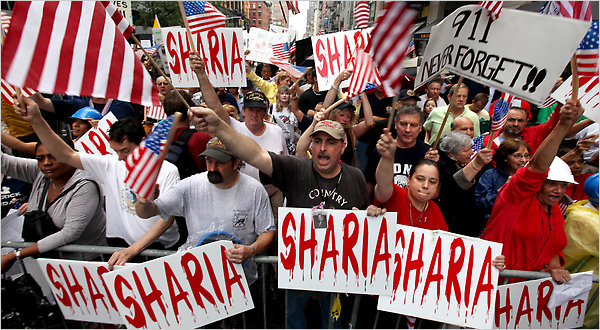
‘Ground Zero mosque’ protest in August 2010
A State Supreme Court judge heard arguments Tuesday in a lawsuit meant to block development of Park51, the proposed mosque and Islamic center near Ground Zero. But he often seemed skeptical of arguments made by the plaintiff and suggested he did not want to challenge the authority of city administrators who had cleared the way for the controversial project.
The lawsuit was brought forth by the American Center for Law and Justice, a Washington, D.C.-based group that fights for conservative causes and has argued that a mosque near Ground Zero would be “deeply offensive to many Americans.”
An attorney for the ACLJ, Brett Joshpe, was joined in court by attorney Jack Lester, who represents the plaintiff, firefighter and September 11 first responder Timothy Brown. Arguing the other side were attorneys Virgina Waters, representing the city, and Adam Leitman Bailey, who represents Park51 developer Sharif El-Gamal.
Lester told the court that the city’s Landmarks Preservation Commission had made an “arbitrary and capricious” decision when it declined to designate 45-47 Park Place as a landmarked building last summer. The address marks the location which will house Park 51, and landmarking would prevent developers from proceeding with their plans.
He also argued that the building, located two blocks from the World Trade Center, deserved to be landmarked because it had weathered the September 11 attacks, and because landing gear from the planes had dropped onto the building. “That building is a monument to that day because of what happened that day, because of its proximity,” said Lester.
Judge Paul G. Feinman, referring to a map showing buildings affected by the World Trade Center attack, noted that “a fair number” of buildings had been damaged. “Are every single one of those buildings to be landmarked?” he asked Lester.
One of the central issues of the lawsuit is the “standing” of the plaintiff, and whether he is in a position to bring a challenge in a neighborhood where he neither works nor resides. According to the complaint, Brown “is an American hero whose courage and bravery on September 11, 2001, exemplifies the American ideal.”
But Feinman suggested the connection between Brown and 45-47 Park Place was insufficient. “It’s not like he went into this building to carry out a rescue operation,” said Feinman.
In his closing arguments, attorney Bailey, who represents El-Gamal, said “the 800-lbs. gorilla in the room is freedom of religion,” and argued that the ACLJ’s true aim was to block construction of a mosque.
